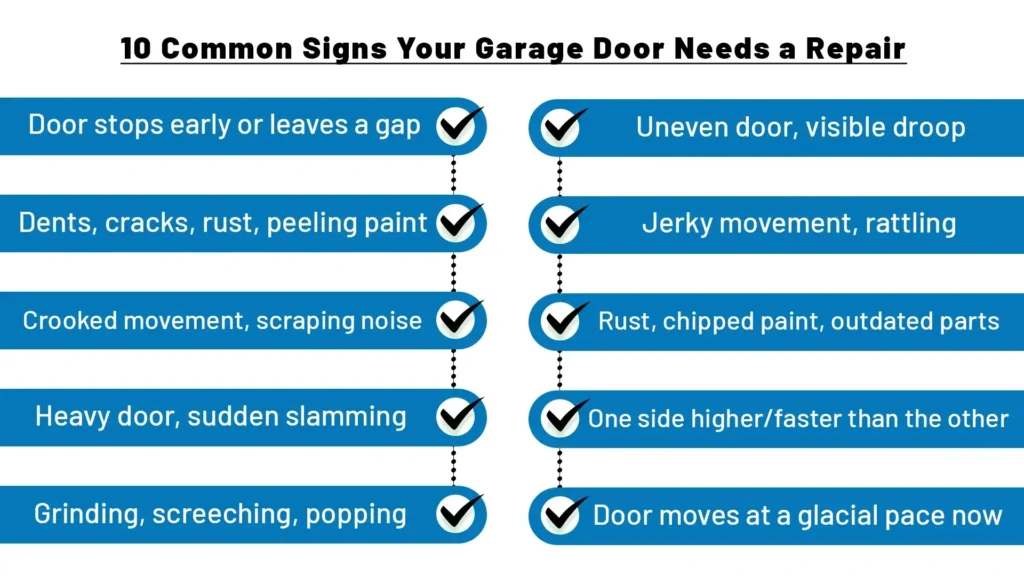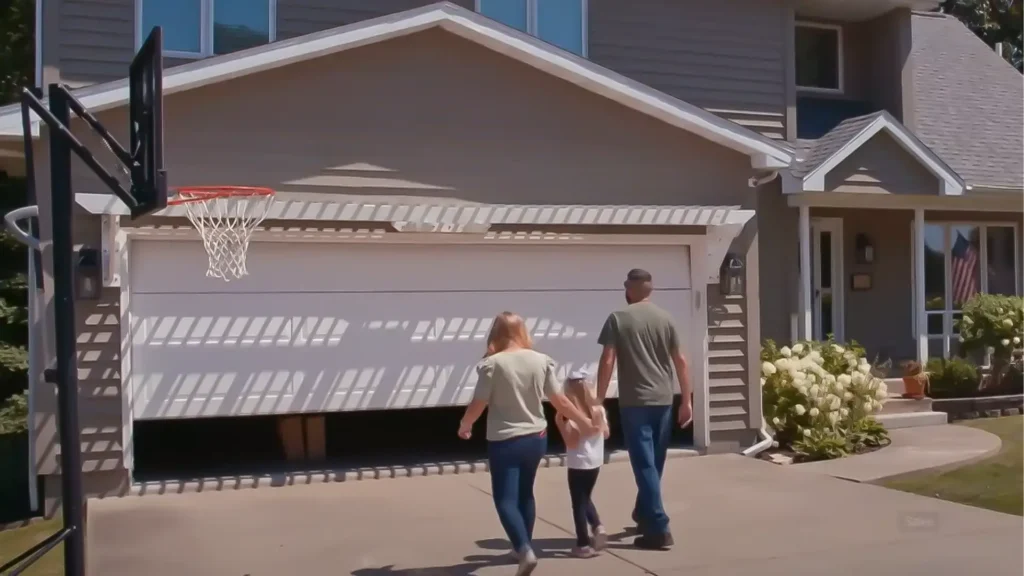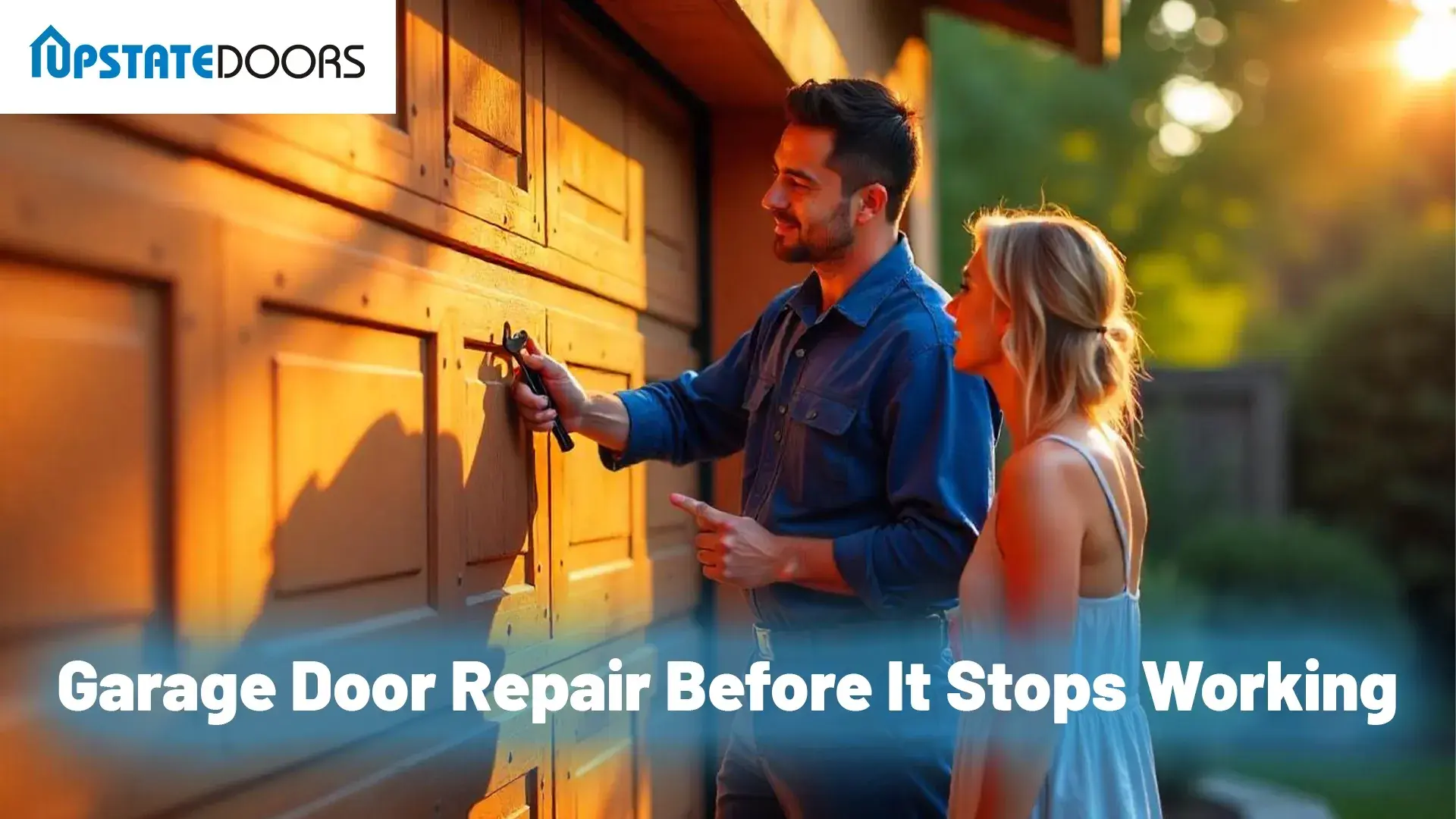Is your garage door making weird noises? Moving slower than usual? Not closing all the way?
Common signs your garage door needs repair include strange grinding noises, worn-out cables, or a door that moves unevenly. It might also feel unusually heavy or slam shut with a loud bang.
If something about your garage door doesn’t feel right, it’s probably not just a small problem. It might seem like a minor hassle now, but ignoring it could lead to safety risks or costly repairs later on. But how do you know when it’s time for a repair?
In this article, we’ll walk you through 10 of the most common warning signs, what they mean, and how addressing them early can save you time, money, and hassle in the long run.
Key Takeways
- If your garage door is making weird noises or acting slow, it’s usually a sign it needs some attention. Fixing things early can save you from bigger headaches later.
- Small problems might seem harmless, but they can quickly turn into costly repairs and create safety issues if you ignore them.
- Getting help from a trusted team like Upstate Doors means you’ll get the job done right, so your garage door stays safe and works smoothly all year long.
10 Common Signs Your Garage Door Needs a Repair

If your garage door is acting up, it’s usually trying to tell you something. Watch for these common warning signs that your garage door needs repair:
Quick Summary
| Problem | What You Might See or Hear | Why It Matters |
| Won’t close properly | Door stops early or leaves a gap | Security risk, sensor or misalignment issue |
| Panels broken or damaged | Dents, cracks, rust, peeling paint | Imbalanced movement, energy loss |
| Falls off its tracks | Crooked movement, scraping noise | Safety hazard, door could jam or fall |
| Damaged springs | Heavy door, sudden slamming | Dangerous, system fails |
| Loud/unusual noises | Grinding, screeching, popping | Wear and tear, potential breakdown |
| Sagging sections | Uneven door, visible droop | Structural weakness, increased stress |
| Shakes or vibrates | Jerky movement, rattling | Could damage mechanisms |
| Signs of old age | Rust, chipped paint, outdated parts | Less safe, more prone to failure |
| Unbalanced door | One side higher/faster than the other | Puts strain on opener |
| Slow operation | Door moves at a glacial pace now | Tired motor or worn rollers |
Let’s know about the signs in details:
Won’t close properly
Your garage door might:
- Start to close but bounce back up
- Stop halfway for no clear reason
- Leave a small gap even when “shut”
These signs often point to problems with the sensors, tracks, or opener. It’s more than a small annoyance as it can leave your home unsecured.
Panels are broken or damaged
If your garage door panels are:
- Dented, cracked, or peeling
- Showing signs of rot or rust
- Letting in drafts or moisture
They’re not just cosmetic issues. Damaged panels can throw the entire door out of balance and wear down the moving parts faster.
Falls off its tracks
A door that’s off-track may:
- Look crooked or tilted
- Get stuck halfway up or down
- Make scraping or popping sounds
This is a serious issue. A door off its tracks can suddenly jam or even fall.
Torsion or extension springs are damaged
Look for these warning signs:
- The door slams shut instead of closing smoothly
- It feels heavier than usual when opening manually
- You notice a visible gap in the spring
Garage door springs carry most of the weight. When they’re damaged, the whole system struggles and it’s dangerous to use.
Makes loud or unusual noises
You might hear:
- Grinding or squealing when the door moves
- Popping, banging, or rattling
- Sudden new noises that weren’t there before
Noisy doors often mean parts are wearing out or need lubrication. If you ignore the sound, it could lead to bigger, costlier repairs later.
Has sagging sections
Signs of sagging include:
- The bottom of the door dipping or bending
- Uneven spacing between door sections
- A wavy look when the door is closed
Sagging usually means worn-out panels or structural damage. Over time, it can affect the entire function of the door.
Shakes or vibrates during operation
If the door:
- Jerks instead of gliding
- Vibrates as it opens or closes
- Feels like it’s working harder than usual
This can signal loose bolts, track issues, or worn rollers. It’s best to get it checked before something breaks.
Shows signs of old age
Older garage doors may show:
- Fading paint or visible rust
- Frequent small issues piling up
- Outdated parts or noisy motors
Age affects performance. Even if it still works, an aging door is less efficient and less safe.
Is unbalanced
Warning signs of an unbalanced door:
- One side moves faster than the other
- The door doesn’t stay in place when stopped halfway
- You hear straining sounds from the opener
Unbalanced doors wear out openers and springs faster and could become dangerous to operate.
Opens or closes slowly
You may notice:
- The door takes longer than usual to open or shut
- It pauses mid-movement
- The opener seems to be working harder than it should
Slow operation could be caused by motor issues, worn-out parts, or lack of maintenance.
Spot any of these? It’s a good idea to get your door checked. A quick tune-up could save you from bigger costs and keep your door running smoothly.
Read More: Top 6 Signs of the Best Garage Door Repair Company In Plattsburgh
Why You Shouldn’t Wait
Small problems might seem harmless but those can quickly become big, costly headaches if ignored. Let’s see why you should take the issues seriously:
- Small problems often turn into major breakdowns
- A broken door can create serious safety risks
- Waiting may cause damage to other parts of the system
- Emergency repairs usually cost more than planned maintenance
- A faulty door reduces your home’s security
- Early repairs save time, money, and hassle
Why Upstate Doors Is the Right Choice for Your Garage Door Repair

Upstate Doors offers top-notch garage door repair, maintenance, and installation services. Our team is dedicated to delivering exceptional quality and a seamless customer experience with every job.
Whether you’re trying to figure out what’s wrong or need a quick, reliable fix, we’re ready to help. We handle every repair with care and professionalism, and you can count on us to get the job done perfectly.
When you choose Upstate Doors, you’re choosing peace of mind and expert service.
Reach out today to learn more or request a quote. Let Upstate Doors keep your garage door safe, secure, and working smoothly all year long.
Final thoughts
We’ve just gone through 10 signs that your garage door might be asking for help. Some might seem small like a weird noise or a slow response but they can quickly turn into bigger (and more expensive) problems if you wait too long.
If any of these sound familiar, it’s probably time to get it checked out. A trained professional can quickly spot the root of the problem, make safe repairs, and ensure everything is working properly.
FAQs
Q: How do I know if my garage door needs to be replaced?
A: If your garage door is over 15–20 years old, has frequent breakdowns, visible damage, or no longer opens and closes properly even after repairs, it may be time for a full replacement.
Q: How do you diagnose a garage door opener problem?
A: Start by checking the power source, remote batteries, and safety sensors. If the motor runs but the door doesn’t move or it opens and then stops, it could be an issue with the opener’s gears, circuit board, or limit settings.
Q: How often do garage doors need to be repaired?
A: Most garage doors need minor repairs every few years, depending on use. But springs, cables, and rollers may wear out faster and need servicing every 5–7 years.
Q: Can I still use my garage door if it’s making noise but works fine?
A: Strange noises usually mean something’s wearing out. It’s best to get it checked before it breaks completely.
Q: How often should a garage door be inspected?
A: Once a year is ideal, but call a professional sooner if you notice any unusual sounds or movement.


